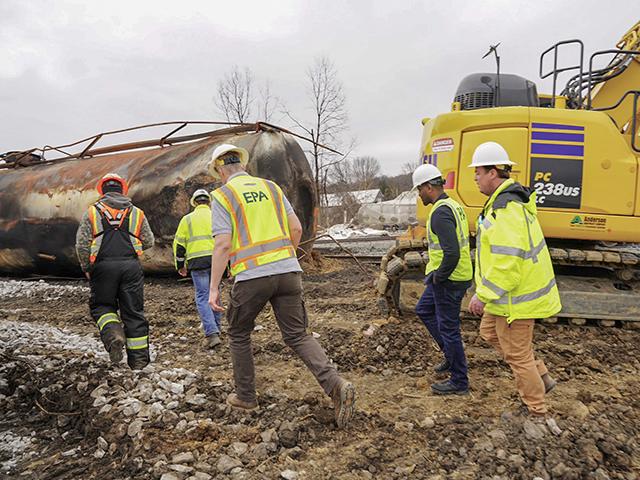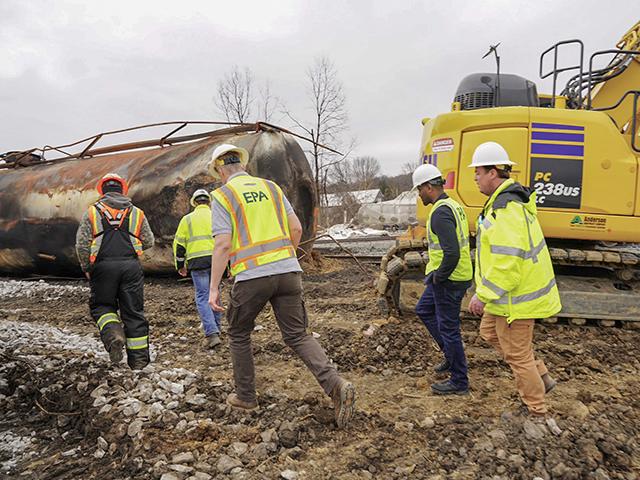Ag Policy Blog
Senator Seeks More Testing, Asks About Ag Disaster Aid Over Train Derailments
It's hard to craft a perfect disaster program for agriculture, especially when the disaster is a man-made event.
Agriculture Secretary Tom Vilsack on Thursday committed to helping increase testing of soil and livestock products around area of the East Palestine, Ohio, train derailment beyond some soil testing that has already begun around the site. But USDA's disaster programs right now aren't crafted to provide direct aid for producers who may be impacted in the area.
Right now, it's also unclear if agricultural producers in the area have suffered direct financial losses from the Norfolk Southern derailment.
During the Senate Agriculture Committee hearing, Sen Sherrod Brown, D-Ohio, said he and Pennsylvania's senators sent a letter to Vilsack and EPA Administrator Michael Regan raising concerns about farmers in the East Palestine region beyond the one-mile radius where federal regulators have been concentrating their work.
With the 2023 planting season is approaching, Brown said farmers in the area "are frustrated in what they see is a lack of guidance and assistance – their words – from USDA."
In his last visit to East Palestine, Brown said farmers were "seeking assurance they can sell their cattle and their crops."
Brown told Vilsack about a cattle producer who is now getting calls from her regular customers who often buy a side of beef from her asking if the cattle and meat are safe.
"And she doesn't know, and these customers will probably look elsewhere just because of the uncertainty," Brown said. "Those farmers more than anything want certainty."
P[L1] D[0x0] M[300x250] OOP[F] ADUNIT[] T[]
Brown asked Vilsack if he would commit to expand testing to a larger geographic area and include testing for dioxins and other chemicals in milk and beef cattle "understanding the costs of that would be, and should be – and we're not going to let them off the hook – paid by Norfolk Southern?"
Vilsack replied, "We'll be happy to do that, Senator. We want to be helpful. I will say USDA sees its role in this particular circumstance as supporting the farmers, but also supporting EPA in terms of being able to precisely figure out where and how and what needs to be done to reassure folks that they can continue to farm and continue to market their products."
Brown added, "So much of it is rebuilding trust, not just them actually making things safer of course."
Brown also acknowledged USDA's disaster programs are generally not well equipped to address accidents such as a train derailment. Brown asked about what type of reforms need to be made to ensure the Farm Service Agency and Rural Development can respond to the next "human-made crisis."
Vilsack said lawmakers likely cannot account for each kind of disaster that occurs, and suggested senators provide flexibility in disaster programs to allow USDA to respond to various causes."
"Senator, as smart as the individual and collective members of this committee are, you will never, ever be able to figure out every possible disaster," the secretary said, "to be able to fashion a disaster program that fits circumstances all of the time, which is why I'm encouraging you to think about flexibility. And also, as disasters strike, they have regional differences as well. The reality is the impact of a particular disaster in one area of the country may be fundamentally different than another area."
Vilsack pointed to the Wildfire and Hurricane Indemnity Program (WHIP and WHIP-Plus), saying when Congress created that ad-hoc program, "nobody anticipated that you would have a winter storm of the magnitude we had in the Dakotas, so we had to kind of look at the language of that and try to figure out, 'Are winter storms included in the language or not?' because we wanted to get help to folks. So it's just really difficult to be as specific as you would like it to be in order to cover anything and everything that can happen."
Congress often directs aid programs to address specific natural disasters that occurred over the prior year, making it easy for lawmakers to write press releases declaring they got aid for their constituents to deal with the disaster that hit them. The $10 billion in disaster aid for 2020-21 that created the Emergency Relief Program (ERP) for instance, inserted "derecho" in the language of the bill to cover the August 2020 storm that swept across the Midwest. That bill also included language to deal with "smoke-tainted" grapes from wildfires in California as well.
Brown brought the discussion back to derailments. "I can guarantee if this body doesn't standup to the railroad lobby, there will be many more train derailments. Ohio has had four in the last six months, including a significant one with 200-plus cars after East Palestine."
Also see, "Farm Size Is No Small Argument in Farm Bill Debate," https://www.dtnpf.com/…
And, "Ohio Department of Ag: No Reason to Suspect Crop Concerns Around East Palestine," https://www.dtnpf.com/…
Chris Clayton can be reached at Chris.Clayton@dtn.com
Follow him on Twitter @ChrisClaytonDTN
(c) Copyright 2023 DTN, LLC. All rights reserved.





Comments
To comment, please Log In or Join our Community .